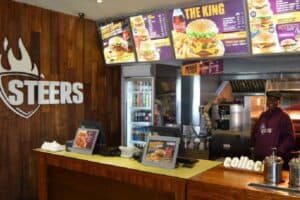Hodes says statistics have shown that restaurants come back much stronger than prior to calamities.

Before lockdown, restaurant owner Larry Hodes and his wife Annie ran a live music bar called Calexico. But they were forced to permanently close it due to the Covid-19 restrictions on gatherings and liquor sales.
Another of their restaurants, Arbour Cafe, is closed for now and will reopen when regulations permit. But Hodes hasn’t allowed this to get him down and has sought out a new way to reinvent his other restaurant, Voodoo Lily, in Birdhaven, Johannesburg, turning it into a gourmet grocery store.
“We are doing food deliveries for Arbour Cafe. I have The Dark Kitchen, which is a delivery-only business (pizzas, Tex-Mex, burgers, ribs etc), which we launched 10 days before lockdown, now beginning to get a lot of traction and going well,” he said.
The Covid-19 pandemic has significantly impacted all businesses in various ways, both positively and negatively. “I had to permanently close Calexico, Arbour is only doing deliveries and at Voodoo Lily, the biggest challenge has been our staff.
“I had close to 40 staff members and almost all of them were stressing about putting food on the table. I am fortunate that I applied to the Oppenheimer fund for all my staff, which was approved, so they at least receive R750 per week for 15 weeks.”
Changing the business model of the restaurant to ensure a viable source of income meant adjusting his mindset and thinking into the future.
“Annie and I were trying to conceptualise a grocer as we knew that it would still be a long time until restaurants got back to normal. At least with a grocer customers could buy foodie items from us.
“The Wednesday before Mother’s Day, Annie and I were trying to decide on what we were going to do for Mother’s Day. At 4pm that Wednesday, we went to WhatsApp and Facebook, asking if anyone was interested in selling premium, upmarket products from our store. Twenty-four hours later, we had a retail gourmet grocer.
“Most of the suppliers were small local suppliers who either sold to restaurants or at markets, which they could not currently do. So, it was a brilliant collaboration between us and small local suppliers,” he said.
Even though it has only been a couple of weeks, the word has spread and they have new suppliers approaching them almost daily. Large businesses that work with small local suppliers are recommending them and businesses like ORT Jet are recommending suppliers to them.
They are working on a business model to continue supporting small businesses. Hodes said part of the plan was “as of now, we are looking at an 80% local/small business and a maximum of 20% large business as suppliers to us”. The response has been “absolutely incredible. Every day our sales are growing more and more.
“The community in the Birdhaven, Melrose, area are very loyal to small local businesses like mine. Most of the locals will rather support us, the local fruit and veg shop and the local butchery, before the large well-known supermarkets”.
Voodoo Lily is best described as a foodie gourmet grocer with products that are not available in most shops. Plans are in place to put the entire grocery store online and deliveries will commence once this is done.
In these tough times and the uncertainty of what’s ahead for small food businesses, Hodes offers some advice: “First of all, have a positive mindset. With so many weeks of lockdown and quite a few restaurants not able to trade, I am coming across quite a few restaurateurs who are falling into a very negative mindset.
“Not only does this affect your health, but you also miss the opportunities that do come around. As Henry Ford said: ‘if you believe you can, you can, if you believe you can’t. The thing is you are always right.’”
He felt that rather than spending time mulling over Covid-19 conspiracies and how the government is handling the pandemic, it was better to use that time to focus on becoming better in businesses and explore angles to carry the business forward.
“I was reading an article in Forbes about restaurants and people predicting a huge decrease in restaurants after various calamities, such as both world wars, the Spanish Flu, Hurricane Katrina in New Orleans, the Great Depression, etc. Statistics have shown that restaurants come back much stronger than prior to calamities.”
He believed that post-Covid-19, there was going to be a huge demand for unique, fresh ingredients in terms of menus. In the ’80s it was all about the product, then from the ’90s until now it has been more about the customer experience.
“I believe we are going to go back to it being all about the product and the customer experience. When Covid-19 begins to end, people will look for comfort food and go back to certain restaurants. However, eventually they will also look for great food coupled with a great experience. All restaurants are going to have to up their game.
“If you are sitting at home, there has never been a better time to work on your restaurant, work on your systems and processes, your menu, your recipes and recipe costings. Work on your business, so you can become a lot more efficient. Start planning how you are going to open your restaurant when the opportunity comes up.”
Health and safety will be the biggest focus by far. “I am going to see how the Gourmet Grocer performs and if it does well, it will become a grocer with a restaurant,” Hodes said.
A key focus for him will be on efficiencies, improved systems and even better quality ingredients.
Info
- 64 Wrenrose Avenue, Birdhaven, Johannesburg
- The Dark Kitchen 010-900-3703 or order directly on www.thedarkkitchen.co.za
- For the Gourmet Grocer call 011-442-6965
For more news your way, download The Citizen’s app for iOS and Android.






